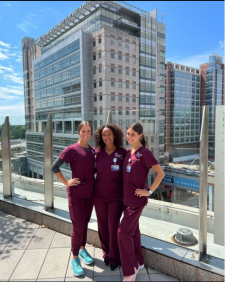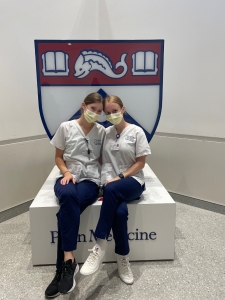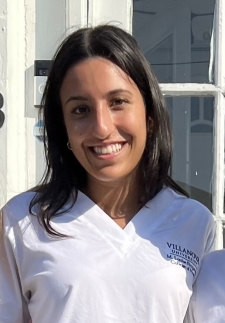Six Summer Oncology Fellows Connect with Families and Gain Valuable Clinical Experience
Students completing junior year at the Fitzpatrick College of Nursing (FCN) who have an interest in cancer care can apply to become a Villanova Nursing oncology fellow and enjoy a summer externship program to gain additional clinical experience and knowledge that builds on their undergraduate nursing curriculum while allowing them to explore career options.
The fellows are supported by the Susan D. Flynn Oncology Nursing Development Program, founded by Fred Flynn in honor of his late wife Susan who lost her courageous battle with ovarian cancer in 2013. He is a member of FCN’s Board of Consultors. Villanova students are co-sponsored by Dee ’86 BSN and Nick Adams. She is also an FCN board member.
The program facilitates and funds undergraduate summer externships in some of the nation’s leading cancer centers for nursing students to develop their interest in the specialty, thereby developing the next generation of oncology nurses. In summer 2022, six rising seniors – a record number from FCN - participated in this immersive opportunity following a rigorous application process.
Rightly proud of the students, Flynn says, “I highly value my wonderful partnership with Villanova’s Fitzpatrick College of Nursing which produces extraordinarily compassionate and well-prepared nursing students.” He notes that of the nineteen Villanova Nursing alumni now in practice, “thirteen are pursuing their passion as oncology nurses.”
The 2022 oncology fellows were at The Children’s Hospital of Philadelphia (CHOP), the Hospital of the University of Pennsylvania and Boston Children’s Hospital. Each student shared her reflections in a recent Q&A.

Having just completed their junior year, nursing students (L to R) Gabrielle Sasso, Naomi Tegene and Kristen Marra spent summer 2022 as oncology fellows at Children's Hospital of Philadelphia.
CHOP: Kristen Marra
Why did you want to pursue the fellowship? Since I was in middle school, I knew I wanted to eventually become a pediatric oncology nurse, specifically at CHOP, because that’s where my younger cousin was treated for her cancer. Throughout my cousin’s journey, I was inspired by the role of the nurses and the differences they had made for my family. I was also inspired by CHOP’s incredible culture as a hospital, because ultimately, CHOP saved my cousin’s life. When applying to summer externship positions a junior nursing student, the Flynn Fellowship stood out to me the most, it sounded like the ideal opportunity to achieve my future career goals. Additionally, I learned that this program is catered to help shape aspiring oncology nurses – with specialized oncology training from the best nurses in the country. Thus, ever since hearing about the Fellowship, it became my goal to obtain this position.
What was your EBP project? I chose to complete my EBP project on the early implementation of pediatric palliative care services. The question that drove my literature search is “In pediatric oncology patients and their families, does early introduction of palliative care at the time of high-risk cancer diagnosis impact quality of life?” I found significant evidence in the literature that introducing pediatric palliative care at the time of a high-risk cancer diagnosis, or shortly after, will improve the quality of life for patients and their families.
What did you see and do? Before the program even began, I had access to immerse myself in two different cancer courses, several books, and a documentary – all regarding oncology, end of life, and palliative care. These resources expanded my knowledge in oncology, which I did not get much exposure to in nursing school.
When I physically began the program at CHOP, it was far beyond everything I hoped for. I was exposed to all aspects of oncology – general chemotherapy, radiation, central lines, bone marrow transplants, side effects and symptom management, survivorship, the outpatient clinic, fertility preservation, and palliative care. I was able to work closely with patients and their families and with each interaction, I felt so prideful and fulfilled that I was making a difference. Each shift, I was paired one on one with a preceptor, where I learned a tremendous amount about the role of the pediatric oncology nurse and gained invaluable hands-on experience. Every preceptor I worked with was so inspiring, passionate, talented, and competent, and I went above and beyond to teach me. We also had weekly “lunch and learns,” which professionals who pursued all different oncology nursing specialties (nurse practitioners, nursing education, clinical nurse specialists, etc.) taught us about their role in cancer care.
Also, I created such a special bond with the other five Fellows and genuinely believe that they have become my lifelong friends. We had weekly debriefing sessions with the five of us (took place before/after our lunch and learns), where got to share our experiences and support one another.
What did you enjoy the most? Overall, the opportunity to make a difference in the patients and their families was the most rewarding part of these 10 weeks and I am so thankful to this program for allowing me to do so.
The shadow days were valuable because I got to shadow different NPs and see these different oncology nursing specialties firsthand and really experience the various career paths this field of nursing has to offer.
What advice might you have for someone considering it for next year? The application process may seem overwhelming, but please do not hesitate to reach out to the upperclassmen and nursing faculty with questions.
CHOP: Gabrielle Sasso
Why did you want to pursue the fellowship? I've always had a strong desire to work in pediatrics and through clinical experiences, along with my oncology research at Villanova, I found that my passions and strengths aligned with the care of these pediatric oncology patients and families. The experiences this program offered seemed like the best way to gain a holistic understanding of pediatric oncology nursing care.
What was your EBP project? My EBP project looked at the standardization of pediatric advance care planning (pACP) documentation for oncology patients at CHOP. I'm very passionate about end-of-life care as well as factors affecting quality of life and find it important for nurses to advocate for EOL discussions so that each member of the healthcare team can provide the best care possible.
What did you get to see and do? This program gives you a great experience of the "day-to-day” of a pediatric oncology nurse and allows you to see yourself in their role after graduation. You get the opportunity to expand your oncology knowledge beyond school lectures, becoming more familiar with oncology/bone marrow transplant terminology, medications, and protocols. A combination of academic and clinical opportunities provides you with a comprehensive foundation of pediatric oncology care, and shadow opportunities with specialized nurse practitioners gives you a wholistic picture of treatment.
What did you enjoy the most? Being able to connect with patients and families over the program’s 10 weeks has been life changing. Many of these families have extended hospital stays with ups and downs, and it has been a privilege to be with them through thick and thin. My favorite part of the fellowship was being able to celebrate the little victories with patients and finding time to do the “little things” to let the patient know how much they're cared for.
What advice might you have for someone considering it for next year? Absolutely apply for this program! The Flynn Fellowship at CHOP gives students an all-inclusive experience of pediatric oncology, as well as the opportunity to work with world-renowned professionals who are truly invested in the Fellows’ learning. It was amazing to be able to work with other students and professionals that are all so passionate about these patients. I cannot say enough good things about this experience.
CHOP: Naomi Tegene
Why did you want to pursue the fellowship? I was initially drawn to the fellowship because of the balance of the oncology-specific clinical experience, observational and academic elements, and evidence-based research offered.
What was your EBP project? My evidence-based project was guided by the question "In newly diagnosed adolescents and young adults, what are best psychosocial interventions to impact coping?" This project culminated in my recommendation that our program integrates technology-based interventions, such as e-Health apps and oncology-specific virtual reality gaming, to aid in coping efforts for this specific population, as supported by evidence.
What did you get to see and do? I experienced the roles and responsibilities of an oncology nurse by partnering with a nurse each shift and providing patient care together. Throughout the summer, I shadowed various roles that nurses hold in the care team such as a Palliative Care NP, Oncology Nurse Educator, and Neuro-Oncology NP. Each week, our cohort participated in lunch-and-learns to further our understanding of the various disciplines involved in a pediatric oncology diagnosis and treatment process. Throughout this experience, I'm grateful to have made meaningful connections with my fellow Fellows, Flynn Fellow alumni mentor and preceptor, and the oncology nurses and care teams at CHOP!
What did you enjoy the most? I most enjoyed the weekly lunch-and-learns since oncology is such a complex, interdisciplinary-collaborative field. By meeting with members of teams such as Radiology, Palliative Care, and Child Life, we were able to better understand their respective roles and scopes of practice, along with how we may collaborate with them best as future nurses to provide optimal care for our future patients.
What advice might you have for someone considering it for next year? I would absolutely encourage anyone interested in the field of oncology to apply for the fellowship! It was truly such an amazing opportunity and I'm beyond grateful for the experience I had this summer as a Flynn Fellow!

Rising seniors Anne Ferry (L) and Carly VanCamp explored facets of oncology nursing as fellows at the Hospital of the University of Pennsylvania in summer 2022.
HUP: Anne Ferry
Why did you want to pursue the fellowship? I wanted to pursue the Flynn Fellowship because of my interest in oncology nursing. Sitting through the oncology lecture in class, I was truly fascinated. I grew up around family members who worked in oncology care, but I never really realized what went into that type of care. I understood that oncology nursing can be challenging, but the rewards of serving this patient population would be well worth the effort, and this was proven to be true after I completed my Flynn Fellowship. I specifically wanted the Flynn Fellowship because of the combination of bedside nursing but also the shadowing experiences. These experiences opened my eyes to other career paths that are possible bedsides just inpatient nursing.
What was your EBP project? My EBP project was “The Importance of Accurate Neurological Assessments for Oncology Patients Receiving Neurotoxic Treatment Options.” I specifically focused on CAR-T therapy and chemotherapy induced neurotoxicity, both experiences I witnessed first-hand on my floor.
What did you get to see and do? I was able to see multiple career paths that can stem from bedside inpatient nursing. I saw outpatient infusion, radiology, bone marrow transplant coordinators, research nursing, and shadowed both my nurse manager and charge nurse for a day. These experiences were a huge addition to the fellowship and how I understood oncology care. Most of the nurses on my floor said they have never seen/understood how these experiences work. It is an incredible experience to be able to see various aspects. I was treated like a real nurse on the floor, so not only did I feel respected, but I gained confidence in my nursing skills.
What did you enjoy the most? I enjoyed connecting with the nurses and patients. I had a patient who would give me a huge hug every time I would leave a shift. He gave me hope and encouragement, and I truly will never forget his face. I loved connecting with my nurses and the floor staff and am still working per diem. I enjoyed the symptom management aspect of oncology nursing, along with the long length of hospital stay for bone marrow transplant patients, meaning connections between the patients and health care team form and lead to more meaningful care.
What advice might you have for someone considering it for next year? If you have any interest in oncology nursing, just apply. This program gives you great insight into bedside oncology nursing, but you are also treated like a new nurse on orientation. Not only will you have oncology experience, but you gain these very important nursing skills. As always, any previous Flynn Fellows would love to talk about their experience or answer any questions!
HUP: Carly VanCamp
Why did you want to pursue the fellowship? I decided to pursue the fellowship because I was interested in oncology nursing and there is no other program like the Flynn Fellowship in which nursing students can experience the full care continuum.
What was your EBP project? My EBP was titled “Exercise and Chemotherapy-Induced Peripheral Neuropathy.” Peripheral neuropathy affects many cancer survivors and impacts quality of life and safety. I researched exercise's role in reducing symptoms and what types of exercise are most effective.
What did you get to see and do? During my fellowship I worked directly with a nurse on my home unit, which specializes in liquid oncology. I also had many shadowing experiences in which I got to experience different practice areas in which nurses can work. This included radiation oncology, outpatient infusion, nurse navigators, outpatient bone marrow transplant coordinators, and admission coordinators. I also shadowed physician assistants working in solid and liquid oncology.
What did you enjoy the most? I really enjoyed meeting the bone marrow transplant coordinators and nurse navigators. They serve such a vital role in patient care. Prior to the Flynn Fellowship I did not know anything about these roles, and it was amazing to learn about all oncology nursing has to offer.
What advice might you have for someone considering it for next year? I would tell someone interested in the Flynn Fellowship that even if they are not 100% sure about pursuing oncology nursing, they could end up loving it! There is so much to learn about oncology nursing. I am so grateful for my Flynn Fellowship experience, and am more confident in my nursing skills moving forward.

Boston Children’s Hospital: Sloane Tirilok
Why did you want to pursue the fellowship? I initially wanted to pursue the Flynn Fellowship because oncology nursing has always interested me. Through my own familial experience with cancer and observing the immense amount of care it involves, I admired the relationship that oncology nurses form with their patients. The compassion and irreplaceable work of these nurses is the impact that I too hope to someday have on people’s lives. Pediatrics particularly interests me because of the additional level of support that is needed for not only them, but their families. Cancer is dooming to anyone, but even more so as a child when the world is still so unknown. Yet, I have learned that it’s not always dark and ominous as it’s typically made out to be. In reality, there is so much light, hope, and goodness that is brought out through what is an incredibly hard process. This outlook is one that I believe is crucial to be shared, and one that I hope to share with my future patients. Upon learning about the Flynn Fellowship, I knew that this would be an incredible opportunity for me to pursue only the beginning of a lifelong career and learn the ins and outs of what it means to be an oncology nurse.
What was your EBP project? My EBP project was focused on mucositis and its profound impact on the pediatric population. Briefly, this is a common and extremely painful side effect of chemotherapy that causes inflammation of the mouth or gut. However, there is evidence that this may be prevented with routine oral care. I focused my project on the implications that practicing routine oral care can have on our patients, and overall help to provide a better quality of life during the course of their treatment.
What did you see and do? During my 8-week experience at Boston Children’s Hospital, I was paired with preceptors on the Bone Marrow Transplant unit, Neurology unit, and Hem/Onc unit. I had the opportunity to learn from many incredible nurses about delivering the highest level of patient and family care. I gained invaluable experience in care skills, including communication, medication administration, assessments, charting, and more.
What did you enjoy the most? The level of independence that I was also given was one of the things that I enjoyed most. This experience was truly unique in the sense that I was constantly with a nurse or provider and learning from them, but then was also able to apply this knowledge on my own when tasks were delegated to me. I learned so much more than I could have ever imagined, and I would not give up this opportunity for anything.
What advice might you have for someone considering it for next year? I would highly recommend applying for this program, even if you are hesitant about it. The knowledge and skills that I gained are transferable to any type of nursing and created a whole new level of confidence in both my academic and clinical careers. This program has opened a wide array of doors for my future, and extensively prepared me for my nursing career. I can genuinely say that this program changed my life and am so immensely grateful to have been a part of it.
